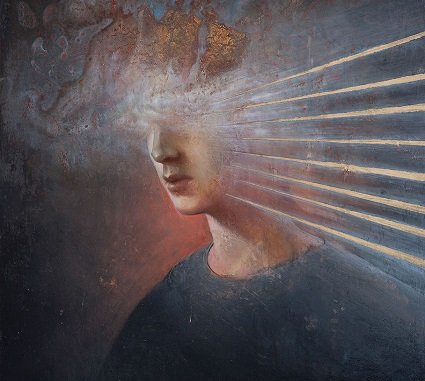
Where Epics Fail – Yahia Lababidi (@yahialababidi)
I really wasn't sure what to expect when I started to read Yahia's new collection of aphorisms. I had heard of the term before, but would have been hard pressed to give a valid and useful explanation as to what they actually were. I suppose to me aphorisms hovered somewhere close to the poetry world, whilst being shorter, and perhaps, at times, wittier. So was this going to be a collection of sayings, or statements?
Perhaps that is what this is, but it is also, and more importantly, so much more than that. I was quite surprised by the mystical current flowing through so much of the work here. It took me back, at least in the feelings it conjured up, to reading The Prophet by Kahlil Gibran, and even the many writings of Rumi. It has a Sufi feel to it. But still so much more than that. It reminded me of my early forays into the Tao Te Ching, and reading Lao Tzu's teachings, and his many statements to help align with life and make sense of the seemingly senseless.

Yahia's aphorisms cover many topics, but a theme runs through them. A reminder of the strength and purpose of silence. How much more powerful than words it truly is. Even as a child growing up in a thoroughly organised religion, with specific rules and doctrines, I still remember reading words that have stayed with me to this day. Words that I refused to interpret in the way those around me did. I read in the Old Testament of the Bible the need to "be still and know that I Am God." To me stillness and knowing stand out here more than God. Stillness is internal. It is akin to silence. Yahia's words were a reminder of its importance. It was a reminder that when I first truly learnt to think for myself, my first thoughts drifted towards the mystical.
I found as I went through this book that I was highlighting more than usual. If I wasn't careful I could have highlighted a majority of the collection. These aphorisms spoke to me, very clearly. They challenged me, amused me, taunted me, and also reminded me of truths I have known but glanced over or forgotten. There is wisdom here, and an opportunity to step aside from the mad rush of life, the constant words, the endless desire to be noticed and paid attention to, and just sit still and contemplate.
A great explanation for what aphorisms are is from one of Yahia's aphorisms themselves:
Aphorisms are headlines, yes, but they are also the entire stories.
There is a sense of the path that underlies the mystic inherent in these words. The concept of the dark night of the soul, or the wounded healer, and the need for an internal vision, and an internal strength comes through here. But a strength born from stillness, and silence. One that celebrates truth, and seeks out justice.
Strange, that surfaces should be celebrated, yet depths apologized for.
If we care for ourselves, we may turn our pain into gifts for others.
In exposing our wounds, healing begins.
There are far more aphorisms flowing through Yahia's work than I could do justice to, and each reader would be drawn to that which speaks to them the most, and perhaps even each new read would highlight ones previously unnoticed. That is their value, to be able to condense words without diluting their meaning. If anything, the lower word count seems to create a greater sense of connection between the reader and the words.
Some worry about dying with wealth unused – far worse to live with love unspent.
To struggle is to get further ensnared: surrender.
I was reminded of William Blake's words;
To see a World in a Grain of Sand And a Heaven in a Wild Flower, Hold Infinity in the palm of your hand And Eternity in an hour.
when I read the following of Yahia's aphorisms;
Everything contains the secret to everything else.
Humour and wit are a strong element in many of these sayings. Like art, humour is a true antidote to the many difficulties we humans face throughout life, as they can pour light on a topic in ways that speak of pain, whilst transcending that pain itself.
Just be yourself, they say. Which one, I think?
As a writer and a poet, Yahia's sayings delve into these topics regularly. Into the relationship between words and the writer, and between words and silence. Here he has said in only a few what I have been saying with several thousand over the last year and a half;

Writers write to silence the voices in their head.
The poem teaches the poet.
The last one I wish to highlight is one that spoke to me profoundly. It challenged me, directly. It speaks of an issue at the core of my life, yet offers up a perspective worthy of being meditated upon, sat with, contemplated and allowed to speak a deeper truth, one inherently visible between the lines, yet remaining silent to those who cannot see.
To those who once held our peace of mind or self-worth hostage. We may gently let them go with these words: "I no longer accept your version of reality."
I have highlighted just a very small number of the ones that grabbed me for one reason or another. Whilst I read through Where Epics Fail quickly, in order to write up a review, this is not really a book you read in one sitting and put away. I don't really think you can put a book like this away. Not once the words have entered in to your soul and your psyche. They will call to you again. I know they have for me.
I am going to forgo giving a rating as I have no idea how to score it. I think my words above explain sufficiently how I value this book, and it's contents. It is, to me, pain relief for a wounded soul. So is that 5 out of 5 stars? You tell me. All I'll say is I recommend this book, just as I recommended Yahia's poetry in general.
You can find more of Yahia's work at his Steemit channel @yahialababidi
You can purchase a copy of Where Epics Fail here
Images provided by @yahialababidi.
Thank you for taking the time to read this. If you liked it then please like, comment, and follow.
@naquoya
 |  |
|---|---|
 | |
Links to earlier works
- Fiction
My Fiction Writing Collection
Writing Myself Out of Existence
When the Levee Breaks
Reality Fading
Lessons Learned From a Dying Man - includes audio version.
Book Reviews
Hellbent - Gregg Hurwitz
1Q84 - Haruki Murakami
Soon - Lois Murphy
Altered Carbon - Richard Morgan
The Girl With The Dragon Tattoo - Stieg Larrson
Do Androids Dream of Electric Sheep - Philip K. Dick
American Gods - Neil Gaiman
Fight Club - Chuck Palahniuk
Crooked God Machine - Autumn Christian
Audio Poetry
The Dance of Destiny and Fate
One Day, Just Not Today
